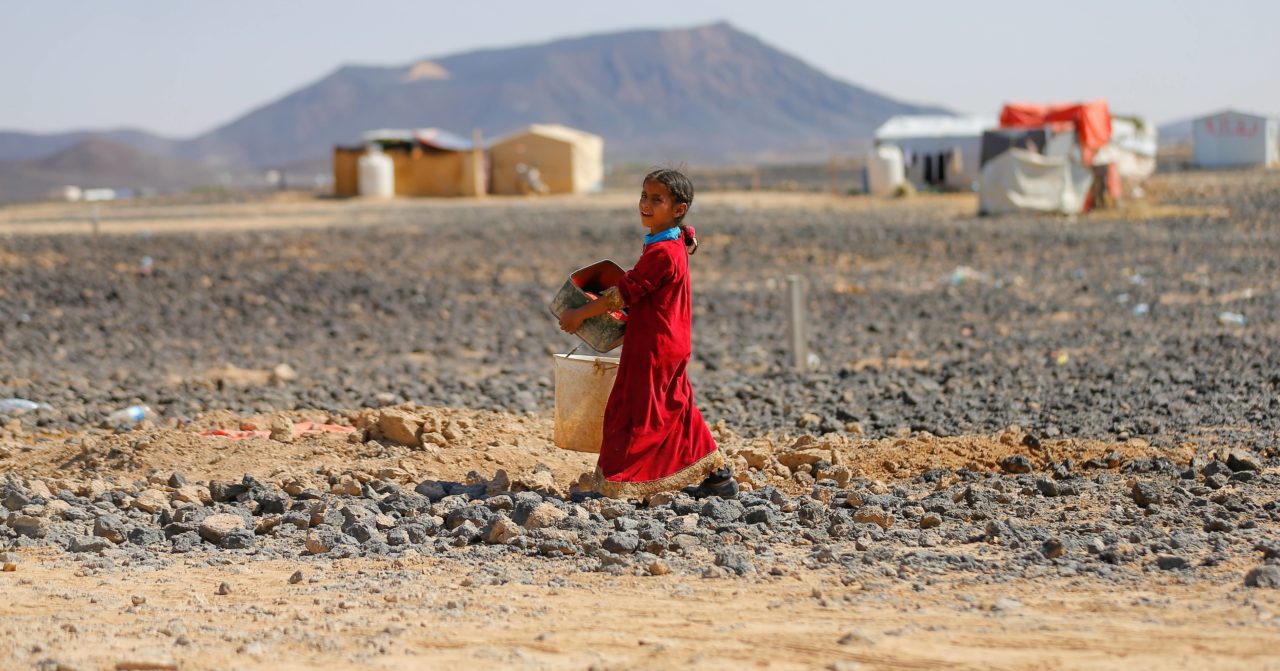 Soap and clean drinking water to keep families healthy
Soap and clean drinking water to keep families healthy
Aid in the world's biggest forgotten crisis
Amaal is ten years old. Like many people in Yemen, she and her family fled from the city to the countryside to escape the war. For three years now, she has been living in the tent of a refugee camp that has formed around an empty school. Amaal's life here is not easy. Again and again she hears the sound of bombs exploding. There is little food for everyone and even water is scarce. Often, what little drinking water there is is contaminated with dirt and germs. Then cholera - a disease that causes violent diarrhoea - becomes a life-threatening danger for these families. It is especially dangerous for young children. To stop the spread of cholera in Yemen, water purification tablets and soap are needed. Sometimes Amaal helps the aid teams distribute the purification tablets and soap. She instructs other refugees on how to use the tablets to make water safe to drink and shows them how washing their hands properly protects them from cholera. One day, Amaal wants to become a doctor and help even more people, she says.
Necessity
Clean drinking water and hygiene for children and their families in Yemen.
Activity
Refugee families receive hygiene CARE kits with water purification tablets, soap and essential supplies.
Countable effort
Number of weeks with clean drinking water and soap to protect against cholera infection.
Result
Families have the knowledge and the means to purify drinking water, store it safely and effectively prevent cholera infection.
Systemic effect
Protecting the health of families and children, saving lives and effectively alleviating the plight of refugee families.
Background
Since the outbreak of the civil war in 2015, the largest humanitarian disaster in the world has been developing in Yemen. Meanwhile, 66 per cent of the population, or 20.7 million people, are dependent on humanitarian aid for their survival (OCHA, 2021a). More than 16 million people in Yemen are suffering acute hunger (OCHA, 2021a). According to the United Nations, 2.25 million children under the age of five are affected (OCHA, 2021a). At the same time, more than 4 million people in the country are fleeing from violence (OCHA, 2021b). In addition to the lack of food, insufficient access to clean drinking water, sanitation, washing and hygiene facilities is a major threat to the health of local families. 15 million people in Yemen currently have no access to sufficient and clean drinking water (OCHA, 2021a). Diarrhoeal and infectious diseases such as cholera spread rapidly in this environment. This is particularly dangerous for children. Already weakened by the effects of war and inadequate nutrition, cholera can be lethal for them.
The good deed
Your donation today will provide a family with children in Yemen with water purification tablets and soap for a week and protect them from the widespread cholera. This is important because severe diarrhoea is life-threatening for the often malnourished children. Soap and water purification tablets are given to the families together with other relief supplies in hygiene CARE packages. In addition, CARE also provides local families with food, repairs destroyed water systems and schools, and provides medicines to healthcare facilities. Families with small children receive goats and seeds so that they can get back to feeding themselves as quickly as possible. At the same time, CARE educates people about health and hygiene. The aim of this support is to save lives and effectively alleviate the acute need of particularly vulnerable children and their families.

AboutYemen
Sanaa
Capital
29,825,968
Number of inhabitants
824 USD
Gross domestic product per capita per year
179 of 189
Human Development Index
Yemen was once a rich trading centre. Its precious stones and spices were in great demand. Today, Yemen is one of the poorest countries. 50 per cent of its inhabitants are under 16 years old. This makes the population one of the youngest in the world (World Population Review, 2021).
About the organization and further information
Association
CARE Deutschland e.V.
Website


Further information and source
- CARE Deutschland e.V., 2021. CARE-Hilfe im Jemen, Aktuelle Daten, Zahlen, Fakten und Eindrücke von vor Ort, Stand: 29.03.2021, Bonn.
- IRC, 2021. Over 100% price increase in staple food contributes to dire humanitarian need as Yemen enters 7th year of war, says IRC, Stand: 26.03.2021, New York.
- OCHA, 2021a. Humanitarian Needs Overview Yemen, ReliefWeb, Stand: 26.08.2021, New York.
- OCHA, 2021b. YEMENSituation Report, ReliefWeb, Stand: 26.08.2021, New York.
- World Population Review, 2021. Yemen Population 2021, Stand: 26.08.2021, Walnut, CA.




